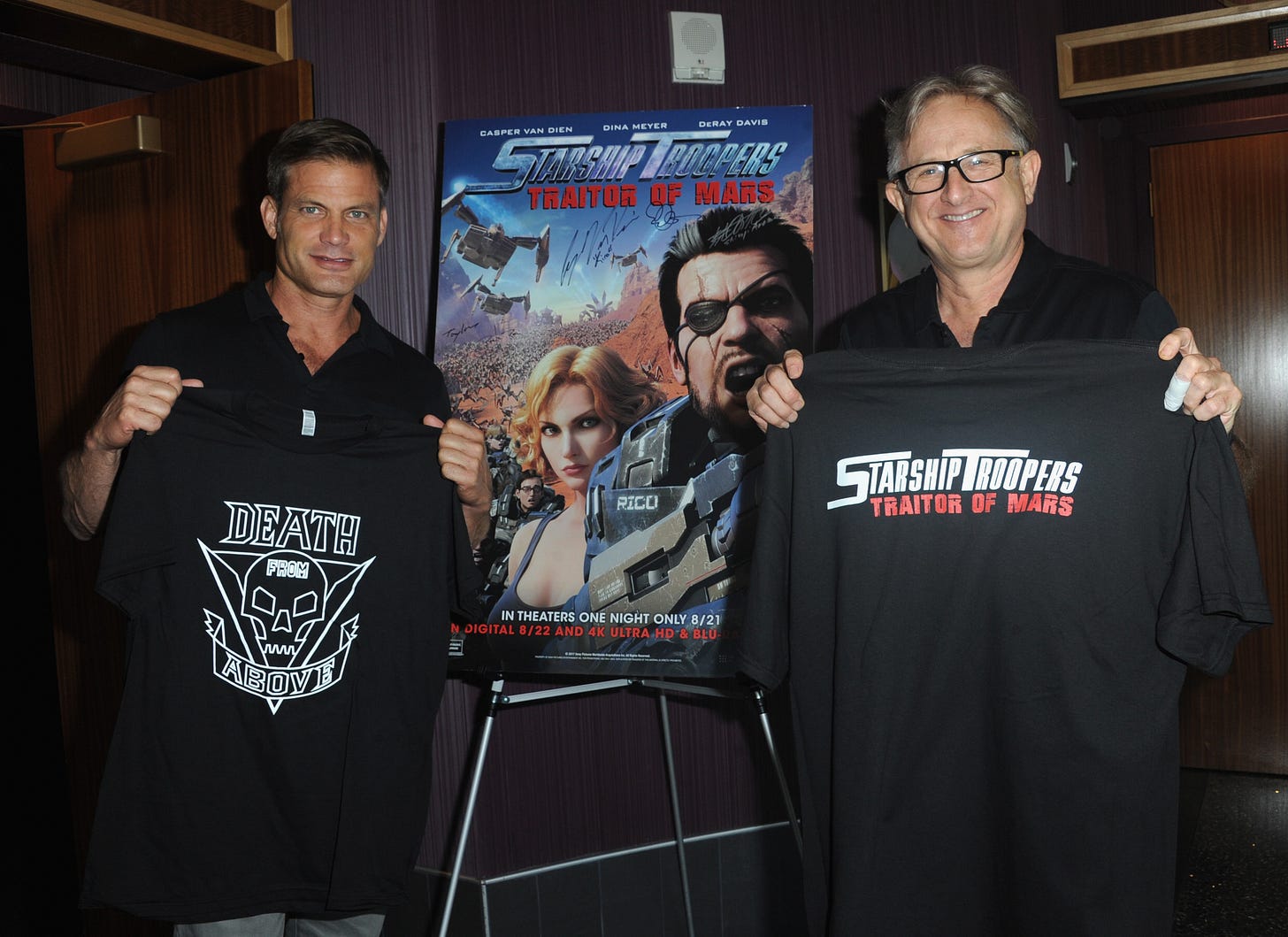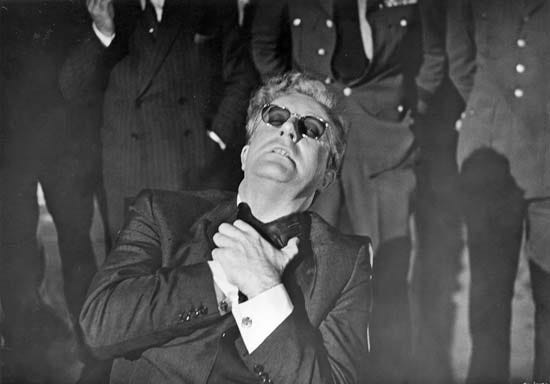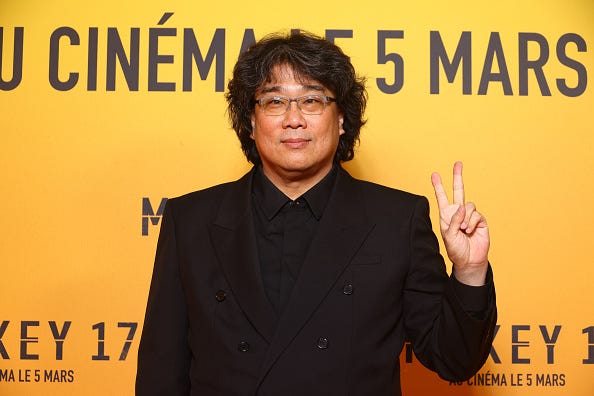The Sunset of Screen Satire
Chasing wider audiences darkens and dulls a once wickedly sharp art

If comedy is harder than dying, as somebody supposedly once said, satire is the hardest subspecies of screen comedy. Satirists not only take on the burden of moral authority in targeting aspects of society perceived as overweening—such as politicians, the military, high finance and Hollywood itself—they must do so with a scalpel rather than a chainsaw. There is nothing duller than broad satire. On the other hand, if a shibboleth is skewered in a theater and nobody buys a ticket, is it still funny?
Satire relies on a bond of trust between the creator and the audience. The satirist assumes the audience understands the language and context he or she is working in and is not supposed to care if they don’t. The audience member trusts artists to be true to their visions, even at the expense of his or her own understanding of specific references.
Once the satirist goes too broad to explain things or to make sure the audience is on board with the proceedings, the bond is broken. The deal is off. The vision is dispelled. And unfortunately, that’s the kind of “satire” Hollywood is producing nowadays, focusing more on commercial success than on humor or social commentary.
Tongue on Wry
As a satirist, Stanley Kubrick struck a balance between precision and marketability in his commercially successful and still popular Cold War black comedy “Dr. Strangelove.” While many character names telegraph the lampooning of the national security apparatus, such as U.S. President Muffley, Russian Ambassador de Sadesky, General Jack D. Ripper and the eponymous national security adviser, a lot of the words coming out of their mouths chillingly echo thinking of the time.
Many of the movie’s scenes have almost a documentary quality, such as the B-52 bomber crew penetrating Soviet airspace and the fight to retake the Strategic Air Command base, where a sign proclaiming “Peace Is Our Profession” is an actual motto. If the peace is maintained through terror, well, that type of thinking is one of Kubrick’s targets.
It is because Kubrick and his fellow screenwriters took such care in enabling their characters to speak in the sometimes wickedly ironic language of their Cold Warrior counterparts that the film earns its broader and iconic comedic moments. These include Maj. “King” Kong riding the nuclear bomb down like a bucking steer or the nominally wheelchair-bound Dr. Strangelove unable to keep his right arm from giving the president a stiff-armed Nazi salute when excited. “Mein Fuhrer! I can walk!”

But the language of satire that Kubrick deployed so well is fading from modern cinema, while broad visual jokes and humor cues are taking over—when we get a comedy at all.
The more humor relies on language and context, the harder it is to pull off. Kubrick did it with consummate skill, but contemporary filmmakers seem to have lost the knack. One of the upsides of China potentially banning Hollywood movies is that U.S. filmmakers will again prioritize the English language as a medium to reestablish the bond between artist and audience. Film studios’ chasing wider international box office success is one reason good comedy is in short supply in the theaters. And it’s definitely the reason satire is now a dying art, in English anyway.
Making a particular work of art more accessible to everybody is fine if you are not self-conscious about it—see, for example, the original “Star Wars.” But if you set out to appeal to this or that market (e.g., China) you end up making questionable accommodations to appeal to your new audience, like diminishing Black people on “Star Wars” movie posters meant for the Chinese market.
Perhaps more importantly, you diminish the language you use to communicate your ideas that might not translate so well or that might offend, say, a totalitarian ruling party whose favor you require to sell your product in its country. In any event, when a comedy needs to be marketable overseas, the precise language, context and characterization that make satire effective are often sacrificed for explosions and people hitting each other and mugging for the camera, cues that are easy to interpret.
Lost in Translation
This diminishment can also occur in the opposite direction, when foreigners make movies for Americans. While there are examples of non-native English speakers making outstanding satires in the American vernacular, lately the record has not been so good. In its enthusiasm for finding new voices, Hollywood has shown that it is more than willing to abandon the nuance needed for effective satire in pursuit of an international face and form.
Warner Brothers tapped a first-rate and feted satirist in his own language, South Korea’s Bong Joon Ho, to make a science-fiction black comedy in English. But “Mickey 17” was pretty bad satire. I saw it out of a sense of duty because so few space colonization movies are being made these days, but it doesn’t have much beyond the premise to recommend it.

The heavy-handed satire of “Mickey 17” is evident from the get-go. The movie centers around an expedition to form a space colony, and the expedition leader, televangelist and failed politician Kenneth Marshall, has worshipful followers who wear red baseball caps. Mark Ruffalo plays Marshall with all the bombast and buffoonery he thinks the former 45th president deserves, from his weird hair and cadence down to a fleeting Trump dance. This is a performance from the heart, and Bong gives him free rein.
According to IMDB.com, the movie was filmed between August and December of 2022. I would be surprised if there were not more updated reshoots, because in one scene a would-be assassin nicks Marshall in the cheek with a bullet. But maybe this was just serendipity and not a parody of the man who would be Trump 47.
Ruffalo’s portrayal of the antagonist most undermines the movie as a satire. Unfortunately, Bong also drags the estimable Toni Collette down as Marshall’s wife, enabler and whip hand. Her performance is also heavy in saucy clowning and inevitable dragon-lady menace. But if Collette’s character is supposed to be Nancy Reagan or Lady Macbeth or Madame Chiang, she’s just another chef overcooking all the flavor out of the satire.
Like a lot of cinema making its way from the Republic of Korea to the West, Bong’s movies have caught our attention because they offer unique windows and perspectives into familiar genres. “The Host,” for example, was a compelling and unsettling monster movie that focused on human relationships and the Republic of Korea’s relationship with its American protectors. A satire, if you will, about the bad you get with the good by being a willing host.
In the same vein, “Parasite,” which made history as the first foreign-language film to win Best Picture, showed that Bong, who also won Best Director, understands satire on a deep level, at least in his native language.
That movie features a lower-class family opportunistically preying on an upper-class family. There is plenty of unpleasantness to go around and there are no class heroes, although characters are treated with respect and understanding. To the point, though, the lower-class Kims may be living parasitically off the upper-class Parks, but the Parks are living parasitically—as per Marx—off the labor of others. There’s an explosion of violence. Like the French Revolution, nobody comes off great in the end.
That’s pretty good satire.
“Mickey 17” also has a satirical center with a promising premise. Mickey Barnes, a nobody with a heart of gold and an enviable body played earnestly by Robert Pattinson, who’s an excellent Batman and lighthouse keeper and seems to be good in everything (I’m untainted by “Twilight”), applies for a space colonization mission to escape his life decisions. He is accepted as an “Expendable,” literally a person who gets all the dirty jobs that will likely kill him because he can be reborn as a clone with his memories intact. One iteration after another dies over the course of the mission. Hence, Mickey 17.
The satire writes itself—but maybe not in English. Whenever the narrative stops making sense in “Mickey 17,” Bong just has the actors shout louder into the camera or run around clowning and secreting bodily fluids. Or make more Trump references, which are legion. This is why the movie by this acclaimed Oscar winner will be forgotten in no time, while more successful satires—such as “Dr. Strangelove” and the 1997 sci-fi cult classic “Starship Troopers”—remain pop culture touchstones to this day.
Do You Want To Know More?
I first saw “Starship Troopers” with my then brother-in-law Marty, who was a bit of a hippie and who had actually rescued a girl from the Manson family compound before all the unpleasantness. As we left the theater, I asked him what he thought of the movie, and he said, “I loved it! It was a World War II propaganda movie!”
That swept aside for me any misgivings I might have had about director Paul Verhoeven and screenwriter Edward Neumeier’s masterpiece of modern satire.
Based on the initial audience reactions (except for Marty’s), the satire element was lost on most viewers. There was a minority like myself who knew Robert Heinlein’s 1959 novel but were amused at the Verhoeven-Neumeier slant made famous in their collaboration on “RoboCop.” Some just enjoyed the movie for what it was marketed as: an excellently produced bloody action flick with spaceships and bugs.
Purists who loved the book were outraged, if only about the lack of armored drop-suits. Philosophical friends of Heinlein’s were horrified at the movie’s portrayal of citizenship earned through military service. Then there were those who hated the movie’s pro-fascist message. That’s when I knew the movie was a winner: The satire went right over their heads.
The movie’s curtain rises on a world with beautiful young people living their best lives under the aegis of a global government that provides order and enables prosperity. A group of well-heeled high school friends is facing decisions on what to do after graduation. In the background, course curricula, news breaks, official uniforms and political symbology alert the mindful viewer to imagery from Leni Riefenstahl’s 1935 propaganda film, “Triumph of the Will.” No wonder Heinlein fans were pissed.
Verhoeven’s personal history is relevant: He lived in his native Netherlands under German occupation as a child during World War II. If Heinlein’s “Starship Troopers” novel lays out a very clear argument for citizenship through military service that is put under pressure by an interstellar conflict with malevolent aliens called Arachnids, Verhoeven doesn’t mock that per se.
War comes to Earth, and the youth of tomorrow have to grow up faster than they intended. Verhoeven’s Arachnids are hostile and expansionist, but he raises the possibility that a “live and let live policy is preferable to war.” This idea is dismissed by our heroes.
The satire of Verhoeven’s movie is in the attractiveness of the “world that works.” In this sense, he is saying that the Terran Federation is prosperous, egalitarian and united. There is no conscription. But if you want to vote, you have to serve. And service clearly can be ugly and bloody and horrible. You don’t have to do it. Protagonist Johnny Rico’s father is a wealthy businessman in Buenos Aires who objects to his son joining the service.
The bite of the satire is in how easy it can be to go along with the attractive and arguably necessary course while still committing morally questionable acts of experimentation on and planet-glassing of your enemies. And fist pump while doing so because they would do the same to you. And then at least reconsider later a bit while pumping gas to drive home.
Sometimes, Less Is More
Even with cannon fire, machine guns and airstrikes, good satire is quiet. It doesn’t necessarily register until later. One of the challenges of proper satire is that the artist has to trust the audience to understand his or her intentions and symbolism without making them too obvious.
One of the reasons Wagner’s “Ride of the Valkyries” became a thing outside of Bayreuth is because of Francis Ford Coppola’s “Apocalypse Now.” The helicopter attack sequence, underscored by the Wagner stirring music, was the first thing filmed because they had to get it right or the movie wouldn’t work. It still stands as one of the most brilliant war scenes ever filmed.
Yet the spearhead of the extended sequence is Robert Duvall’s Kubrickian Col. Kilgore, while our protagonist, Martin Sheen’s Capt. Willard, mostly is relegated to observer status. Kilgore mounts his air cavalry attack with admirable efficiency, and the battle is in turns exciting, tragic, comic and triumphant—and riding a crest of satire. It ends on a beach with a napalm strike designed to quiet enemy mortars to enable some surfing.
In the theatrical cut of the movie, after Kilgore’s memorable soliloquy about napalm in the morning smelling like victory, he pronounces his last line: “Some day this war’s going to end.” Then he nods wistfully and exits. That’s perfect satire.
The problem with making satire is that it’s not generally obvious and thus not easily popular. In “Starship Troopers,” Verhoeven and Neumeier went all in on the hidden satire. The marketing for the movie featured the science-fiction elements and the action scenes. Even though the movie was released in the late ’90s, the special effects completely hold up (they lost to “Titanic” at the Oscars but shouldn’t have), and I still find the movie eminently rewatchable. You can argue that by keeping the satire as dry as possible, the team ruined their opportunity to make money with it. The best kind of art.
I’m not alone in thinking so. The movie has a following that in my opinion exceeds cult status. Like a fine wine, it gets better with age. The satire is more pronounced now that it is well defined by modern audiences, but in that “Oh, I see it now” way that was a missing in the initial release.
More to the point, others have appreciated the satirical gem for its own virtues and have gone forward with the conceit in game form. The “Helldivers” videogame series, developed by Arrowhead Studios and published by Sony Interactive, is a “Starship Troopers” game in all but name. And since Sony Pictures Imageworks took the lead on the movie’s special effects, it’s possible some cross-pollination exists.
The game embraced the Verhoeven style of satire while delivering a solid first-person-shooter experience. (If I were the Dutchman I’d be annoyed if I didn’t get a piece of the action.) According to online game retailer Steam, “Helldivers 2” has made more than $1.35 billion to date. By contrast, “Starship Troopers” had a worldwide box office of about a tenth as much. Yet “Helldivers” would not exist without Verhoeven making a satire of Heinlein’s “Troopers” and recognizing the value of keeping that tongue planted firmly in cheek.
Satire is supposed to exist for the generations, not to win big at the box office or to easily parody particular people the filmmaker wants to be seen mocking in front of his new friends and benefactors. Many people regard Miguel de Cervantes’ “Don Quixote” as a keystone satire in Western literature, which specifically pokes fun at the over-the-top chivalry of the titular character. But my son, Alex, pointed out that sometimes the character Don Quixote is right, if delusional. Sort of like Inspector Clouseau, except we are closer in cultural reference to the latter. One of the reasons high school students might shun Cervantes is that they haven’t been taught about the twilight of the European chivalric order that was occurring as he wrote the novel.
At its most effective, satire invites us to understand and even sympathize with the object of derision. This requires a level of trust between the artist and the audience that is fading from modern cinema. If the gaming community gets it, perhaps it is not too late to find a common language between directors who want to smuggle in a dark joke and moviegoers content to get it later.



